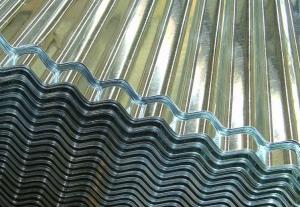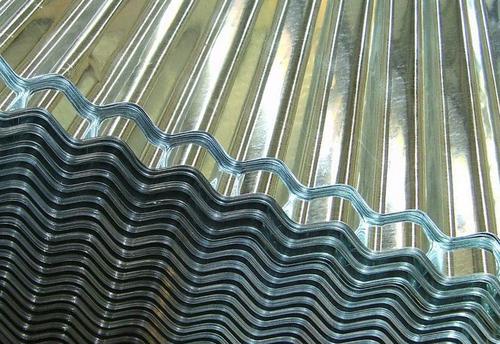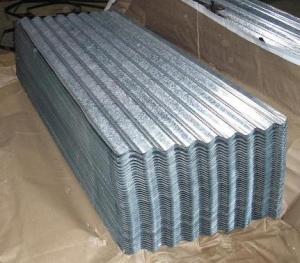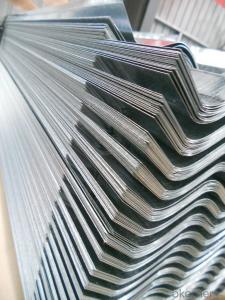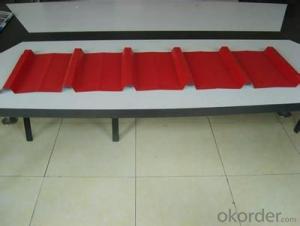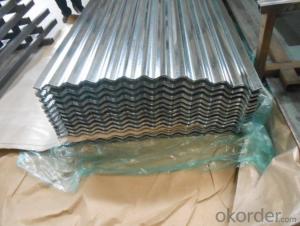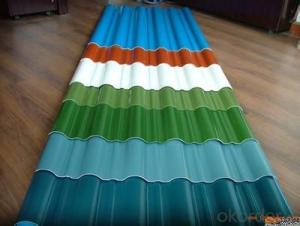Galvanized Corrugated Sheet
- Loading Port:
- China Main Port
- Payment Terms:
- TT OR LC
- Min Order Qty:
- -
- Supply Capability:
- -
OKorder Service Pledge
OKorder Financial Service
You Might Also Like
Product Description:
We specialize in manufacturing galvanized steel coil, galvalume steel coil, prepainted steel coil and galvanized corrugated sheets.
Nowadays our company has grown up to a collectivized company . We are grateful to the cooperation partner who`s grown with us all the way. We hope we could make more friends from all over the world. Under the joint efforts of both sides we believe that we will continue to achieve win-win results based on mutual trust and mutual support.
Quick Details
| Standard: | Grade: | Thickness: | |||
| Place of Origin: | Brand Name: | Model Number: | |||
| Type: | Technique: | Surface Treatment: | |||
| Application: | Special Use: | Width: | |||
| Length: | Based Material: | Material: | |||
| Zinc Coated: | Spangle: | Shape: | |||
| Galvanized Type: | Business: | Payment Terms: | |||
| Packaging: | Delivery Detail: |
Packaging & Delivery
| Packaging Detail: | Fully seaworthy export packing with paper tube Each coil is wrapped in water-proof paper. |
| Delivery Detail: | about 15 days after the deposit if the quantity below 500 ton. |
Specifications
Corrugated gi/gl/ppgi Sheet
1.Thickness: 0.13mm-1.0mm
2.Width:750mm-1250mm
3. z40-z150g/m2
4.ISO 2000,SGS
- Q: What are the different coil leveling methods used for steel coils?
- There are several coil leveling methods used for steel coils, including roller leveling, stretcher leveling, and tension leveling. Roller leveling involves passing the coil through a series of rollers to remove any curvature and create a flat surface. Stretcher leveling involves stretching the coil in different directions to remove any shape irregularities. Tension leveling applies tension to the coil during the leveling process to eliminate any residual stresses and create a uniformly flat product.
- Q: benchmade mpr with m390 steel knife. Is it better than d2 s30v or 154cm steel?
- From what I understand m390 is a new steel (at least for benchmade) so there doesn't seem to be a consensus on how it performs. Looking at the table, it should be very corrosion resistant. I'd guess it could be classified as a stainless steel. Sorry I don't have more info for you. EDIT: here's a link from the steel manufacturer. I hope this info helps.
- Q: You have two steel wool pads,one is cut up into little pieces, and the other is whole, and they are both submerged in water. 1.Which steel wool pad will rust quicker?2.How much faster will that pad rust? (estimate+explain the estimate)6.How could you make the steel wool pad rust faster?Please dont tell me to do my homework because I tried, but I bought the wrong type of steel wool
- steel wool = iron fibers and rusts easily in air iron + Oxygen BUT the blue soap protects the iron at first. that needs to be cleaned off. damp surfaces speed the rusting but compeletly underwater there is not much O2, ther eis some temperature has an effect. the rusting depends ofn the area of the fibers which does NOT change when you cut th epad in smaller pieces. a good beginners experiment In old times thye thought the rusted material would lose weight becasuse it was not solid iron any more careful experiments showed it gained weight and lead to and understanding of chemistry
- Q: How are steel coils tested for quality?
- Steel coils are tested for quality through a series of rigorous inspections and tests. These include visual inspections to identify any surface defects, dimensional measurements to ensure proper size and shape, and mechanical tests such as tensile strength and hardness tests. Additionally, non-destructive testing methods like ultrasonic testing and magnetic particle inspection are used to detect internal defects or cracks. These comprehensive quality checks ensure that steel coils meet the required standards and are fit for their intended applications.
- Q: How are steel coils used in the manufacturing of industrial equipment?
- Steel coils are commonly used in the manufacturing of industrial equipment due to their versatility and strength. These coils are typically made from high-quality steel and are shaped into a coil form to facilitate easy transportation and storage. One of the primary uses of steel coils in industrial equipment manufacturing is for the fabrication of structural components. These coils are often cut, shaped, and welded to create various parts and structures that provide support and stability to the equipment. For example, steel coils can be used to construct frames, beams, and brackets that form the backbone of heavy machinery. Steel coils are also used in the production of mechanical components such as gears, shafts, and bearings. These components require high strength and durability to withstand the heavy loads and harsh operating conditions encountered in industrial settings. By using steel coils, manufacturers can ensure that these parts have the necessary strength and resilience to perform reliably. Additionally, steel coils are employed in the manufacturing of equipment surfaces that require corrosion resistance or aesthetic appeal. Steel with specific coatings or finishes can be rolled into coils to create sheets or plates that are used to construct outer casings, panels, or covers for industrial equipment. These coatings not only protect the equipment from environmental factors but also enhance its appearance. Furthermore, steel coils can be transformed into pipes and tubes, which are vital components in many industrial applications. These pipes are used to transport various fluids, gases, or materials within the equipment. The strength and structural integrity of steel coils ensure that the pipes can withstand high pressure, temperature, and mechanical stress, making them suitable for demanding industrial environments. In conclusion, steel coils play a crucial role in the manufacturing of industrial equipment. They are used to fabricate structural components, mechanical parts, surface finishes, and pipes. The versatility, strength, and durability of steel coils make them a preferred choice in the industrial equipment manufacturing industry.
- Q: How do you prevent damage to steel coils during transportation?
- To prevent damage to steel coils during transportation, several measures can be taken: 1. Proper packing and securing: Steel coils should be packed tightly and securely in order to prevent any movement or shifting during transportation. This can be achieved by using appropriate packaging materials such as steel cradles, wooden dunnage, or steel straps to hold the coils in place. 2. Cushioning and padding: Adding cushioning materials such as foam padding, cardboard, or bubble wrap between coils can help absorb shocks and vibrations during transit. This extra layer of protection minimizes the risk of scratches, dents, or other damages caused by contact with other objects or surfaces. 3. Adequate handling and loading: Using proper lifting equipment and techniques is crucial to avoid mishandling and dropping of the steel coils. Forklifts or cranes should be used to lift and load the coils carefully onto transportation vehicles. Additionally, coils should be stacked in a way that distributes weight evenly to maintain stability. 4. Weather protection: Steel coils are susceptible to corrosion, so it is essential to protect them from moisture and adverse weather conditions during transportation. Coils should be covered with waterproof and weather-resistant tarps or shrink wrap to prevent water or moisture from reaching the steel surfaces. 5. Regular inspections: Regularly inspecting the coils before, during, and after transportation is vital to identify any potential damage or issues. This allows for timely intervention to rectify any problems and prevent further damage. 6. Properly trained personnel: Ensuring that personnel involved in handling, loading, and transporting the steel coils are adequately trained is crucial. They should be aware of the proper procedures and techniques to safely handle and transport the coils, minimizing the risk of damage. By implementing these preventative measures, the risk of damage to steel coils during transportation can be significantly reduced, ensuring that the coils reach their destination in optimal condition.
- Q: What are the different types of steel coil surface treatments for outdoor applications?
- There are several different types of steel coil surface treatments that are commonly used for outdoor applications. These treatments are applied to the steel to enhance its durability, corrosion resistance, and appearance. Some of the most commonly used surface treatments for outdoor applications include: 1. Galvanized: Galvanization is a process where a layer of zinc is applied to the steel surface. This treatment provides excellent corrosion resistance, making it ideal for outdoor applications. Galvanized steel coils have a shiny, silver appearance. 2. Galvalume: Galvalume is a combination of aluminum and zinc, which is applied to the steel surface. This treatment provides superior corrosion resistance compared to galvanized steel. Galvalume steel coils have a duller, matte finish. 3. Painted: Steel coils can be painted with a variety of coatings to enhance their appearance and protect against corrosion. The paint can be applied in a single or multiple layers, depending on the desired level of protection. Painted steel coils are available in a wide range of colors and finishes. 4. Powder Coated: Powder coating is a type of paint coating that is applied as a powder and then cured under heat. This treatment creates a durable and long-lasting finish. Powder coated steel coils are resistant to chipping, scratching, and fading, making them suitable for outdoor applications. 5. Organic Coated: Organic coatings, such as PVC or PVDF, are applied to steel coils to provide additional protection against corrosion and weathering. These coatings are typically used in architectural applications where aesthetics and durability are important. These different types of steel coil surface treatments offer various levels of protection and aesthetic options for outdoor applications. The choice of treatment depends on factors such as the intended use, environmental conditions, and desired appearance.
- Q: Can steel coils be used in the automotive industry?
- Steel coils find extensive use in the automotive industry. They are frequently employed in the production of diverse automotive components and parts. Specifically, they are well-suited for applications necessitating robustness and longevity, such as body panels, chassis components, suspension parts, and engine components. Steel coils exhibit remarkable structural integrity, corrosion resistance, and impact resistance, all of which are indispensable attributes for automotive purposes. Besides, they can be effortlessly molded and shaped into desired dimensions, rendering them exceptionally adaptable and cost-effective for automotive manufacturers. In summary, due to their outstanding mechanical properties and adaptability for diverse automotive applications, steel coils enjoy widespread utilization in the automotive industry.
- Q: How are steel coils used in the manufacturing of suspension systems?
- Steel coils are used in the manufacturing of suspension systems as they provide the necessary support and flexibility to absorb shocks and vibrations, ensuring a smooth and comfortable ride. These coils are typically used in coil spring suspension systems, where they are compressed and stretched to absorb and distribute the weight of the vehicle, maintaining stability and enhancing overall performance.
- Q: I've played guitar for years, now I want a steel guitar. As a beginner, to learn and experiment with, which one would be better for me?
- Pedal steel is very difficult. You need to co-ordinate both hands, both feet and both knees to play it effectively. Lap steel is a lot easier. I suppose it depends how much of a challenge you want. A good lap steel guitar is usually cheaper than a good pedal steel too, so that's another consideration to take into account.
Send your message to us
Galvanized Corrugated Sheet
- Loading Port:
- China Main Port
- Payment Terms:
- TT OR LC
- Min Order Qty:
- -
- Supply Capability:
- -
OKorder Service Pledge
OKorder Financial Service
Similar products
Hot products
Hot Searches
Related keywords
